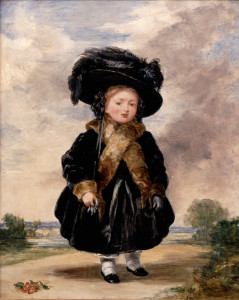The unhappy childhood of Princess Victoria of Kent, the future Queen-Empress, has become legend among fans of Royal history. But when we have a close look at the facts, is it possible that the prone-to-drama matriarch had exaggerated her early suffering?
For those of us who would self-identify as raging Queen Victoria fans, the day she ascended the throne is considered one of great victory.
Not just, of course, did this mark a turning point in the destiny of the monarchy. Gone was the debauchery of George III’s irreputable sons and a new star of purity had risen. Soon would Albert come along and together they would craft of model of constitutional monarchy and an example of Royal family that has lasted until this day.
But for those of us particularly interested in her life prior to Queenship, her elevation marked something else: the day when she could find herself ‘quite alone’ from her mother and throw off the shackles of Sir John Conroy the man who had made her childhood a living hell.
But had he?
I had certainly always thought so. Having read up on the Queen-Empress since my teenage years I had always swallowed the standard account: that she was kept in isolation, deprived of contact with the King and court, bullied by Conroy into agreeing to his demands and shown little love from her mother.
Having, however just read the biography of her by A.N. Wilson, I have had pause for thought. This account of her childhood does, of course, come down to us entirely from Victoria herself, and most of it through the lens that she would look back upon her upbringing much later in life.
That being said, we shouldn’t get carried away. Conroy was clearly a bully and her account of him being all but physically abusive to try and get the ill Princess to sign a note confirming him as her private secretary upon ascension seems to be widely verified. Similarly there is more than enough reason to think that her mother was guilty of more than a few errors of judgement and has to take much of the responsibility for the fact that Victoria was almost totally unprepared for her constitutional destiny.
But on balance was it really the upbringing of tragedy which comes across so strongly from the history books? Certainly the following has to be said for her early years:
- Whatever else was happening, she always had the loving support of Lehzen, her loyal governess. She stood by the young Princess throughout thick and thin and it was ultimately Prince Albert, not her mother, not Conroy, who would cause their separation.
- Materially, Victoria was still a young lady of privilege. Yes, by Royal standards they didn’t have a lot to shout about but having studied my own family history I’ve learnt just how horrible growing up in industrial revolution Britain could be. Victoria was at the pinnacle of privilege.
- Not only did her mother have some resources, they were invested kindly in Victoria. There is evidence that she had plenty of dolls and toys and that she enjoyed playing with them. Similarly she clearly spent a lot of time with her portraits and paintings and on visits to the theatre. Although I guess the theatre didn’t sell choc-chip ice cream in the 1830s.
- While Victoria complained of being lonely and isolated this was not strictly true. Conroy’s daughters were on hand as playmates. While her loathing of the man running the household may well have caused her to resent them, it is unlikely these feelings were fully developed in the earlier years of girlhood. Likewise she did have sibling – from her mother’s first marriage – and there is evidence she got on well with them.
There can be little doubt that Victoria’s later childhood was problematic. While not a child genius she was more than aware that she was at the centre of a power struggle and her actions toward Conroy after she becomes Queen show how deeply she must have resented him. But her grief when her mother eventually died was genuine. She remembered then how in her earliest years, she was loved, even if she had subsequently forgotten it.
It is perhaps then, not the most unreasonable assumption that there were other moments of tenderness, happiness and joy that she – the mother of rewriting history – had forgotten as well.
So…over to you Geeks. Have I underestimated how hard Victoria’s childhood was? Have I given her too much credit given she lived a life of luxury? Have I forgotten how much of a monster Conroy might have been? What do YOU think?
